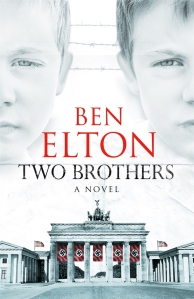I don’t usually dip into historical fiction, as the writers often hide poor character-building behind supposed historical accuracy instead. Often the books are unreadable due to their saturation of research and lack of coherent plot or technical ability. But Two Brothers is not ruined by either of these things: instead it manages to capture madness rather than shoving it in the face of the reader.
Undoubtedly, any story with Nazis in it treads a fine line between being comically grotesque or insultingly dramatic. While the Nazi regime was undoubtedly hideous, boundless in depravity and as insane as it was ruthless, it is still possible for an author to trip over this into ridiculous territory. Every sane person knows the Nazis were evil. But it takes a talented author to shade in the madness at all of its levels rather than creating a caricature that strips it of its terror. And, too often, books rely on ‘here’s a Nazi thing, so terrible so terrible’ without taking the time to put the horror in context and give it the appropriate depth.
Two Brothers follows the story of a family from Berlin 1920 right through to 2006 (but without being one of those tedious ‘the story of three generations, family, love, wark wark’ efforts). When Frieda gives birth to twins and one dies, she immediately adopts another son whose mother dies in childbirth. That the child is German is unimportant to this Jewish mother, and the first quarter of the book is filled with the loveliest of stories of the boys Otto and Paulus, as well as the charming father Wolfgang and beautiful, kind mother Frieda. One becomes grateful for this time setting up the characters and their personalities, because by the end of it I truly cared for this family, ruined by the Nazis. (This isn’t really a spoiler – it is a book about a Jewish family in Nazi Berlin, after all.)
I enjoyed this book particularly because it combined outstanding research with several levels of human pain – from petty teenage fighting to full-scale war, from unrequited love to suicide to being rounded up and taken away. The insanity of the regime, often forgotten amongst the industrial scale of its cruelty, is looked at in the Nazi schooling, the petty laws (so similar to Apartheid) and in two key events in German history: The Night of the Long Knives and The Night of Broken Glass.
There are thousands of books about the Nazis, and about the lives they ruined. I have read a few, key of them being Fugitive Pieces by Anne Michaels, Maus by Art Spiegelman and Night by Elie Wiesel. The good ones are the ones that balance horror with hope, which is hard to do with such heart-rending material. This book has stayed with me since I finished it, which doesn’t happen nearly as often as it should. I felt such anger towards the character of Dagmar, who is selfish and beautiful and doesn’t deserve the love of the wonderful Stengel twins. Poor Silke, who is kind and loyal and never gets rewarded for it. Frieda, the brave Jewish doctor who was filled with kindness and strength until the very end, and who I will remember through many books, and her musical, ruined husband Wolfgang, who goes through more than any one should have to endure. Through them, and those they meet, the true horror of the Nazi regime is delivered right into the reader’s heart. In the sixty-odd years since the Holocaust, that entire terrible time has become so caricatured, appropriated and simplified that sometimes we need a book that explains the extent of Nazi crime, the slow, fine grinding of Jewish lives into something approximating oblivion and the people caught up in it.
Read this because it is a wonderfully detailed, wide-ranging story of a family you will come to adore within an exquisitely, carefully detailed setting. It does not trivialise violence by putting it at the very front and centre, but keeps it constantly menacingly in the background. I would give this to my children one day as part of their reading, to help them understand the nature of the Nazi regime, in all of its howling, murderous insanity.
Want to read what others think? Head on here:
Jenny Colgan at the Guardian.co.uk
Elena Seymenliyska for The Telegraph
Liked this? Try these:
Originally posted at http://zoehinis.com




No comments yet.